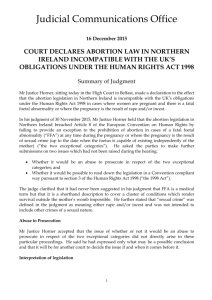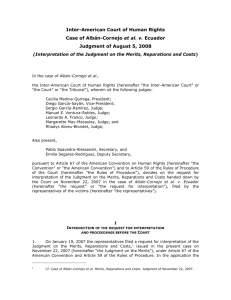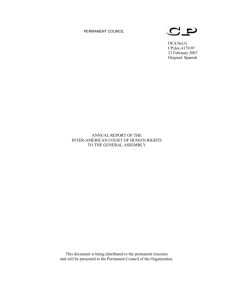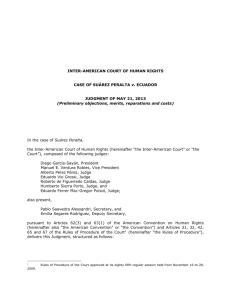joint separate opinion of - Corte Interamericana de Derechos
advertisement
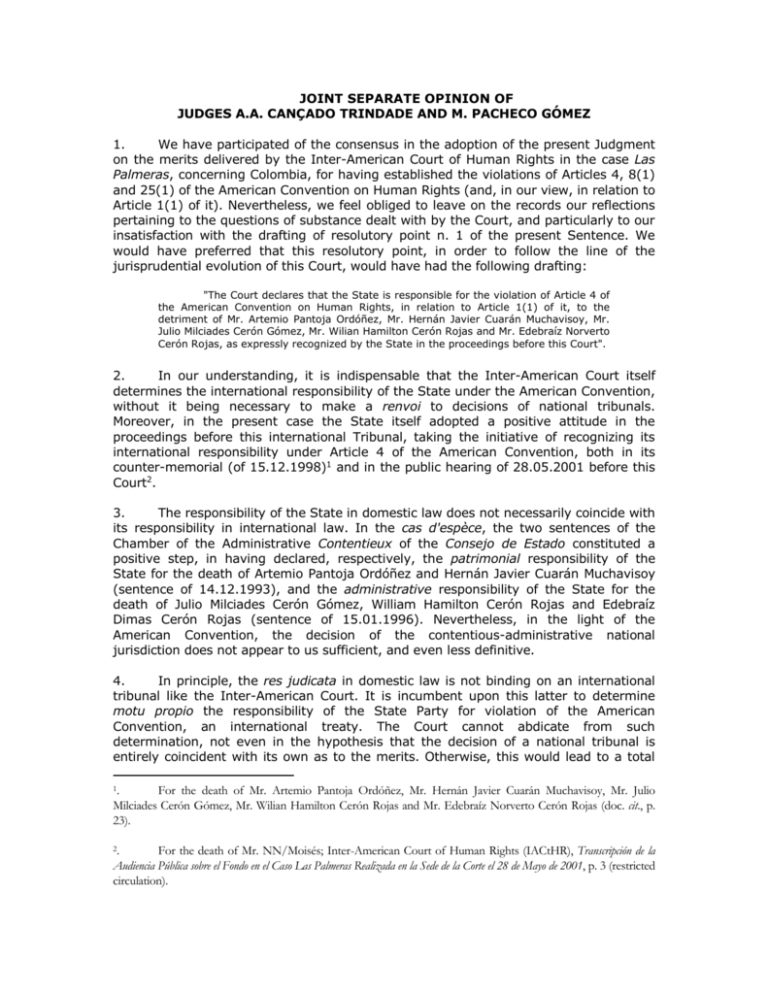
JOINT SEPARATE OPINION OF JUDGES A.A. CANÇADO TRINDADE AND M. PACHECO GÓMEZ 1. We have participated of the consensus in the adoption of the present Judgment on the merits delivered by the Inter-American Court of Human Rights in the case Las Palmeras, concerning Colombia, for having established the violations of Articles 4, 8(1) and 25(1) of the American Convention on Human Rights (and, in our view, in relation to Article 1(1) of it). Nevertheless, we feel obliged to leave on the records our reflections pertaining to the questions of substance dealt with by the Court, and particularly to our insatisfaction with the drafting of resolutory point n. 1 of the present Sentence. We would have preferred that this resolutory point, in order to follow the line of the jurisprudential evolution of this Court, would have had the following drafting: "The Court declares that the State is responsible for the violation of Article 4 of the American Convention on Human Rights, in relation to Article 1(1) of it, to the detriment of Mr. Artemio Pantoja Ordóñez, Mr. Hernán Javier Cuarán Muchavisoy, Mr. Julio Milciades Cerón Gómez, Mr. Wilian Hamilton Cerón Rojas and Mr. Edebraíz Norverto Cerón Rojas, as expressly recognized by the State in the proceedings before this Court". 2. In our understanding, it is indispensable that the Inter-American Court itself determines the international responsibility of the State under the American Convention, without it being necessary to make a renvoi to decisions of national tribunals. Moreover, in the present case the State itself adopted a positive attitude in the proceedings before this international Tribunal, taking the initiative of recognizing its international responsibility under Article 4 of the American Convention, both in its counter-memorial (of 15.12.1998)1 and in the public hearing of 28.05.2001 before this Court2. 3. The responsibility of the State in domestic law does not necessarily coincide with its responsibility in international law. In the cas d'espèce, the two sentences of the Chamber of the Administrative Contentieux of the Consejo de Estado constituted a positive step, in having declared, respectively, the patrimonial responsibility of the State for the death of Artemio Pantoja Ordóñez and Hernán Javier Cuarán Muchavisoy (sentence of 14.12.1993), and the administrative responsibility of the State for the death of Julio Milciades Cerón Gómez, William Hamilton Cerón Rojas and Edebraíz Dimas Cerón Rojas (sentence of 15.01.1996). Nevertheless, in the light of the American Convention, the decision of the contentious-administrative national jurisdiction does not appear to us sufficient, and even less definitive. 4. In principle, the res judicata in domestic law is not binding on an international tribunal like the Inter-American Court. It is incumbent upon this latter to determine motu propio the responsibility of the State Party for violation of the American Convention, an international treaty. The Court cannot abdicate from such determination, not even in the hypothesis that the decision of a national tribunal is entirely coincident with its own as to the merits. Otherwise, this would lead to a total 1. For the death of Mr. Artemio Pantoja Ordóñez, Mr. Hernán Javier Cuarán Muchavisoy, Mr. Julio Milciades Cerón Gómez, Mr. Wilian Hamilton Cerón Rojas and Mr. Edebraíz Norverto Cerón Rojas (doc. cit., p. 23). 2. For the death of Mr. NN/Moisés; Inter-American Court of Human Rights (IACtHR), Transcripción de la Audiencia Pública sobre el Fondo en el Caso Las Palmeras Realizada en la Sede de la Corte el 28 de Mayo de 2001, p. 3 (restricted circulation). 2 juridical relativism, illustrated by the "endorsement" of a decision of a national tribunal when it is considered in accordance with the Convention, or else the determination that it does not generate, or ought not to generate, legal effects (as decided by this Court in the recent cases of Barrios Altos, Merits, Judgment of 14.03.2001, and of Cantoral Benavides, Reparations, Judgment of 03.12.2001) when it is considered incompatible with the American Convention. 5. It may be recalled, in this respect, that, in its Judgment on preliminary objections (of 26.01.1999) in the case Cesti Hurtado versus Peru, this Court discarded the objection of the respondent State to its competence to pronounce on the personal freedom of an individual whose juridical situation had already been resolved by a definitive sentence with the authority of res judicata. In rejecting the argument, the Inter-American Court pondered that "in international jurisdiction the parties and the matter in controversy are, by definition, different from those in domestic jurisdiction"3, as the substantive aspect of the controversy before the Court is whether the respondent State has violated the international obligations which it contracted in becoming Party to the Convention. 6. From the standpoint of the Inter-American Court, the only thing which is definitive is its own determination of the compatibility or otherwise with the American Convention of administrative acts and practices, national laws and decisions of national tribunals of the respondent State. No one questions the principle of the subsidiarity of the international jurisdiction, which refers specifically to the mechanisms of protection; nor should one lose sight that, at substantive level, in the present domain of protection, the norms of the international and domestic legal orders are in constant interaction, to the benefit of the protected human beings. 7. In the present case, the aforementioned sentences of the contentiousadministrative jurisdiction of the respondent State established the (patrimonial and administrative) responsibility of the State, expressly and specifically by "fault of service" ("falla del servicio") of the National Police of Colombia (of the Ministry of Defence), as a result of the death of the victims. We fear that there may arise occasions in which the thin layer of formal juridicism is badly utilized so as to perpetuate impunity. In our understanding, such decisions, though they may constitute a positive step, are manifestly insufficient in the light of the norms of protection of the American Convention, bearing in mind the general duty of the States Parties of guaranteeing the free and full exercise of the protected rights. 8. It is for this reason that we consider indispensable to link expressis verbis - in the resolutory point n. 1 of the present Judgment - the violation of Article 4 of the Convention to the general obligation set forth in Article 1(1) of it, in conformity with the jurisprudence constante of this Tribunal. If one were not to accept the wide scope (encompassing all the rights protected by the Convention) of the general obligation, immediate and of fundamental importance, of guaranteeing the protected rights, set forth in Article 1(1) of the Convention, one would be depriving this latter of its effects in domestic law. 9. It is not at all surprising that the general and fundamental duty of Article 1(1) of the American Convention finds a parallel in other treaties of human rights4 and of 3. IACtHR, Series C, n. 49, p. 20, par. 47. 4. V.g., Covenant on Civil and Political Rights, Article 2(1), Convention on the Rights of the Child, Articles 3 International Humanitarian Law5. Such obligation of guaranteeing is reinforced, in Article 1(1) of the American Convention, by the additional qualification of the principle of non-discrimination. In the present case, in order to consider as definitive the condemnations of the national contentious-administrative jurisdiction (a hypothesis that we do not accept), one would have to determine whether such condemnations have effectively contributed to put an end to impunity, in order to secure the non-repetition of the wrongful acts, and to guarantee the free and full exercise of the rights protected by the Convention. In the present case, this requires demonstration. 10. Our position coincides, moreover, with the international case-law in this respect, which has considered civil responsibility as insufficient to fulfill the requirements of international protection. Thus, in the case Yasa versus Turkey (Preliminary Objections and Merits, Judgment of 02.09.1998), for example, a chamber of the European Court of Human Rights pondered that "an administrative-law action is a remedy based on the strict liability of the State, in particular for the illegal acts of its agents, whose identification is not, by definition, a prerequisite to bringing an action of this nature. However, the investigations which the Contracting States are obliged (...) to conduct in cases of fatal assault must be able to lead to the identification and punishment of those responsible (...). That obligation cannot be satisfied merely by awarding damages (...). Otherwise, (...) the State's obligation to seek those guilty of fatal assault might thereby disappear"6. 11. In the same line of reasoning, in the case Kaya versus Turkey (Preliminary Objections and Merits, Judgment of 19.02.1998), a chamber of the European Court of Human Rights decided that the violation of a right protected by the Convention could not be remedied exclusively by the establishment of civil responsibility (and the payment of compensation to the relatives of the victim)7. And, in the case Ergi versus Turkey (Preliminary Objections and Merits, Judgment of 28.07.1998), a chamber of the European Court decided that, although there did not exist substantial evidence that the security forces had caused the death of the victim, the State failed in its duty of protection of the right to life of the victim, taking into account the conduct of the forces of security and the lack of an adequate and effective investigation, - and, accordingly, it incurred into a violation of Article 2 of the European Convention8. 12. In securing the duty of control which the State ought to exert over all its organs and agents in order to avoid successive violations of the rights conventionally protected, the thesis of the objective responsibility of the State (engaged as from the violation of its international obligations) is, in our understanding, the one which most 2(1) and 38(1). 5. V.g., the four Geneva Conventions of 1949 on International Humanitarian Law (Article 1) and the Additional Protocol I of 1977 to these latter (Article 1(1)). 6. European Court of Human Rights (Chamber), Yasa versus Turkey case, Judgment of 02.09.1998, Reports of Judgments and Decisions, n. 88, p. 2431, paragraph 74. 7. 8. Paragraph 105 of the Judgment referred to. European Court of Human Rights (Chamber), Ergi versus Turkey case, Judgment of 28.07.1998, Reports of Judgments and Decisions, n. 81, p. 1779, paragraphs 85-86. 4 contributes to secure the effectiveness (effet utile) of a human rights treaty and the realization of its object and purpose. On the basis of this thesis, the positive obligations of protection on the part of the State9 are reinforced, with particular vigour, including the guarantee of non-repetition of the wrongful acts. 13. As pointed out in a Dissenting Opinion in a case before this Court almost half a decade ago, "it is one thing to act as an appeals tribunal or a court of review of the decisions of tribunals in the framework of domestic law, which the Inter-American Court cannot do. It is quite another thing, wholly distinct, to proceed, in the context of a concrete contentious case (in which the existence of victims of human rights violations has been established), to the determination of the compatibility or otherwise with the provisions of the American Convention of administrative acts and practices, national laws and decisions of national tribunals, which the Inter-American Court surely can and ought to do"10. 14. In the present Judgment in the case Las Palmeras, the Court has pointed out, as to the military as well as ordinary penal process, the obstructions and delays (paragraph 56) which have made the process last for more than ten years and not yet having resulted in a sentence on the part of the Juzgado 41 Penal of the Circuit of Bogotá. The Court has, thus, correctly established the violation of Articles 8(1) and 25(1) of the Convention, - but in our view this occurs also in relation to Article 1(1) of the Convention. 15. The considerations of the Court as to the co-relation between Articles 8(1) and 25(1) fit into the line of jurisprudential construction of the evolution of the due process of law as a whole (with emphasis on the right of access to justice and the realization of this latter). The evolutive character of the due process of law itself was pointed out by the Court in its 16th Advisory Opinion, on the Right to Information on Consular Assistance in the Framework of the Guarantees of the Due Process of Law (1999)11, - a pioneering Advisory Opinion, which has served as guidance and inspiration to the international case-law in statu nascendi on the matter. 9. Cf., on the matter, e.g., Jules Basdevant, "Règles générales du droit de la paix", 58 Recueil des Cours de l'Académie de Droit International de La Haye (1936) pp. 670-674; Eduardo Jiménez de Aréchaga, El Derecho Internacional Contemporáneo, Madrid, Ed. Tecnos, 1980, pp. 319-325, and cf. pp. 328-329; Ian Brownlie, System of the Law of Nations - State Responsibility - Part I, Oxford, Clarendon Press, 1983, p. 43; Ian Brownlie, Principles of Public International Law, 4th. ed., Oxford, Clarendon Press, 1995 (reprint), p. 439; Paul Guggenheim, Traité de Droit International Public, tomo II, Genève, Georg, 1954, pp. 52 and 54; L.G. Loucaides, Essays on the Developing Law of Human Rights, Dordrecht, Nijhoff, 1995, pp. 146 and 149-152; Paul Reuter, "Principes de Droit international public", 103 Recueil des Cours de l'Académie de Droit International de La Haye (1961) pp. 592-594 and 598-603; C.W. Jenks, "Liability for Ultra Hazardous Activities in International Law", 117 Recueil des Cours de l'Académie de Droit International de La Haye (1966) pp. 105-110 and 176-196; Karl Zemanek, "La responsabilité des États pour faits internationalement illicites, ainsi que pour faits internationalement licites", in Responsabilité internationale (org. Prosper Weil), Paris, Pédone, 1987, pp. 36-38 and 44-46; Benedetto Conforti, Diritto Internazionale, 5th. ed., Napoli, Ed. Scientifica, 1997, pp. 360-363; J.A. Pastor Ridruejo, Curso de Derecho Internacional Público y Organizaciones Internacionales, 6th. ed., Madrid, Tecnos, 1996, pp. 571-573. 10. IACtHR, case Genie Lacayo versus Nicaragua, Resolution on Revision of Sentence, of 13.09.1997, Dissenting Opinion of Judge A.A. Cançado Trindade, Series C, n. 45, p. 48, par. 25 n. 21. 11. IACtHR, Advisory Opinion n. 16 (of 01.10.1999), Series A, n. 16, pp. 110-112, pars. 117-122, and cf. pp. 108-109, pars. 113-114. 5 16. This Court has, moreover, in recent cases, sustained that, although Article 8 of the American Convention is titled "Judicial Guarantees", it is certain that it assumes that any public authority, - whether administrative, legislative or judicial, - ought to respect the guarantees established in the Convention, by means of its resolutions that determine rights and obligations of the persons12. In relation to the subject-matter of the case sub judice, the Court has also pondered that the discretionality of public power, in any matter, "has unsurmountable limits, one of them being respect for human rights" and the "guarantee of the due process"13. 17. The relationship of Articles 8(1) and 25(1) with Article 1(1) of the Convention in the present case is ineluctable. It may be recalled that, in the recent case of the "Street Children" (Judgment on the Merits, of 19.11.1999), concerning Guatemala, this Court has established that "Article 25 is closely linked to the general obligation of Article 1(1) of the American Convention, in that it assigns duties of protection to the States Parties through their domestic legislation, from which it is clear that the State has the obligation to design and embody in legislation an effective recourse, and also to ensure the due application of the said recourse by its judicial authorities"14. 18. In fact, the close link between the obstruction of the duty of investigation and the persistence of the impunity cannot be denied. In the same Judgment in the case of the "Street Children", the Court pointed out that, for the determination of the international responsibility of the States for violations of human rights, it should undertake an examination of "all the domestic judicial proceedings in order to obtain an integrated vision of these acts and establish whether or not it is evident that they violated the standards on the obligation to investigate, and the right to be heard and to an effective remedy, which arise from Articles 1(1), 8 and 25 of the Convention"15. 19. In the present case Las Palmeras, the domestic judicial activity as a whole encompasses both the administrative contentieux as well as the military and ordinary penal process. Such activity ought to produce concrete results, bearing in mind the general duty of the States Parties to the American Convention of guaranteeing the free and full exercise of the protected rights. Only thus will the non-repetition of the wrongful facts be secured. It is possible that, with the developments of contemporary International Law, and as human conscience reaches a higher degree of evolution, the rigid borderlines of civil and penal responsibility established by the legal science of the past began gradually to vanish. 12. IACtHR, case Baena Ricardo and Others versus Panama (Merits, Judgment of 02.02.2001), Series C, n. 72, par. 124; IACtHR, case Ivcher Bronstein versus Peru (Merits, Judgment of 06.02.2001), Series C, n. 74, par. 102; case of the Constitutional Tribunal concerning Peru (Merits, Judgment of 31.01.2001), Series C, n. 71, pars. 69-71. 13. IACtHR, case Baena Ricardo and Others versus Panama (Merits, Judgment of 02.02.2001), Series C, n. 72, par. 126. 14. IACtHR, Series C, n. 63, p. 199, par. 237. 15. IACtHR, Series C, n. 63, p. 194, pars. 223-224 (emphasis added). 6 Antônio Augusto Cançado Trindade Judge Manuel E. Ventura-Robles Secretary Máximo Pacheco-Gómez Judge






